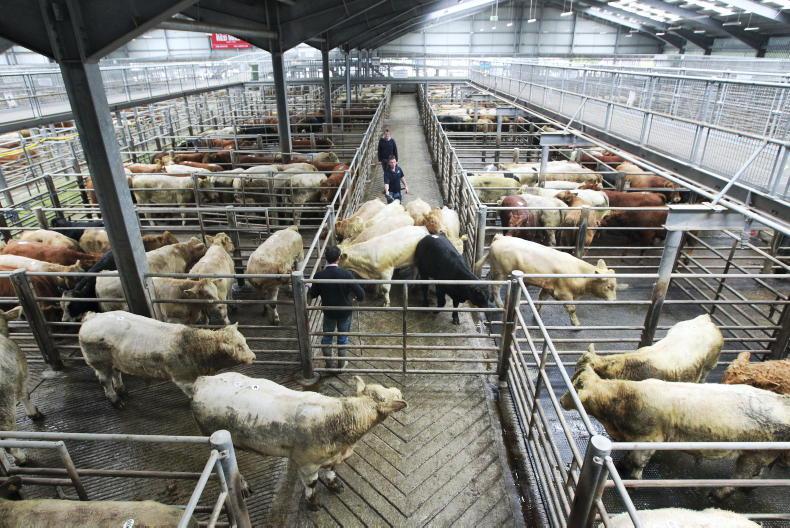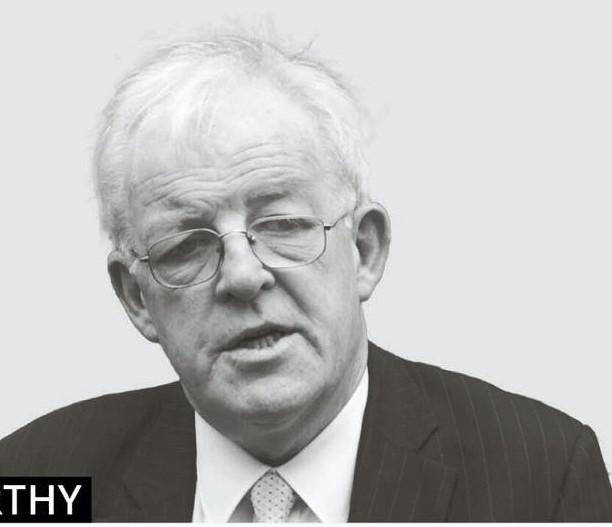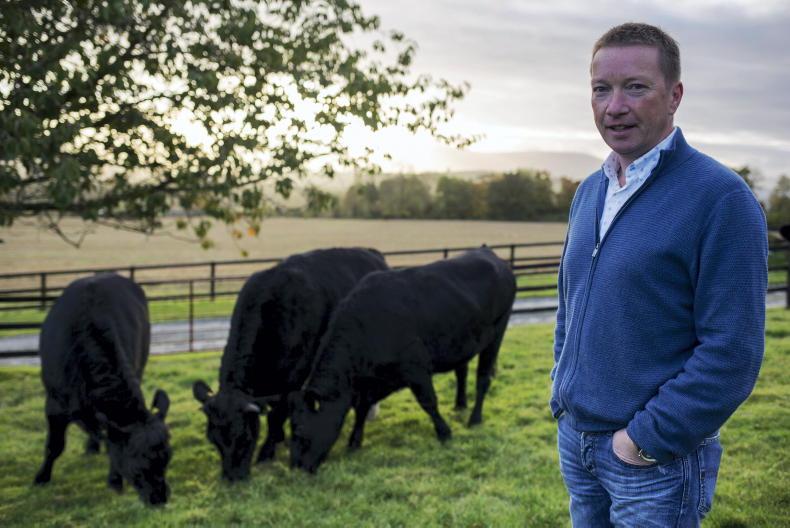An investigation by the Irish Farmers Journal into the origin of food being served up in NI schools and hospitals shows that the majority of fresh beef, lamb, pork and poultry originates from the UK or Ireland, but there are variations, especially when it comes to frozen or cooked meat.
The investigation was prompted by reports that some local secondary meat processors have been offering imported beef from south America at very competitive prices, and this was being pushed into public sector contracts.
Our work has found that this is generally not the case, and if this meat is available locally it is most likely that it is being supplied into lower-end restaurant and catering trade.
In NI, the two main public sector bodies buying meat are the Education Authority (on behalf of local schools) and Business Services Organisation (on behalf of health trusts). It is understood that between them they account for over 80% of expenditure on food by government departments.
As part of our investigation, we searched through contracts tendered by government departments, agencies and arms-length bodies on the eTenders NI website.
That work showed that the Education Authority offered a contract in 2018, worth up to £12.5m over four years, for the supply of fresh beef, pork and lamb. Other notable awards included an £8.5m contract offered in 2017 by Business Services Organisation (BSO) for the supply of fresh beef, lamb, pork and poultry to health trusts.
Under Freedom of Information legislation, we asked both the Education Authority and BSO for the country of origin of the meats used in various contracts.
Supply
Etherson Meats, a secondary meat processor based in Ballymoney, Co Antrim, obtained the large contract to supply beef, lamb and pork to schools and also has a contract to supply fresh beef, pork and lamb to hospitals.
According to the information obtained, the majority of the beef supplied by Ethersons is either from the UK (which we presume to be actually NI) or the Republic of Ireland, with a small amount obtained from the Netherlands and Poland.
Lamb supplied by Ethersons is all labelled as UK origin, which again presumably means it is sourced from NI, while its fresh pork is mainly from the UK and Ireland, with some originating from Spain and the Netherlands.
Outside of the big foodservice companies, the other main supplier of meat to NI hospitals is Galway-based Heaney Meats. In February 2019 it won a £3.4m contract to supply chilled, cooked meats. While the company claims that all its fresh beef is 100% Irish, the cooked meats it supplies originates from various countries, including Ireland, Chile, Ukraine, Thailand and Brazil.
That leaves various large foodservice companies, such as Coleraine-based Lynas Foodservice, Belfast-based Musgrave Wholesale Partners and Newtownabbey-based Henderson Foodservice.
These companies basically work as intermediaries, offering a wide range of goods. They generally do not manufacture themselves, but are instead supplied by various agri-food companies, including the likes of Dale Farm, Lakeland Dairies or Moy Park.
At present, poultry into NI schools is supplied by Lynas Foodservice and originates from the UK, the Netherlands and Ireland.
However, a large £8.8m contract to supply frozen foods into hospitals is split across all three companies.
The information obtained shows that frozen beef comes from Musgrave Wholesale Partners, part of the Irish Musgrave Group.
This beef all originates from the Republic of Ireland.
Frozen chicken and turkey from Henderson Foodservice originates from China, Thailand, the UK and Ireland.
Frozen pork from Lynas Foodservice is mostly UK and Ireland origin.
That leaves fresh poultry supplied by Musgrave Wholesale Partners into local hospitals, which is all listed as being either UK, Ireland or of EU origin.
Public procurement – how it works
The Department of Finance is responsible for policy around how government procures goods or services in NI, with the overall strategy set by the Executive at Stormont.
In 2002 a revised policy was put in place, with Stormont ministers agreeing that “best value for money” was a core principle. In 2011 this definition was revised to “the most advantageous combination of cost, quality and sustainability to meet customer requirements”.
So in effect, while “best value for money” is the primary objective, those issuing and awarding contracts can consider other issues. Guidance re-issued in 2016 recommended that, wherever possible, public bodies should ensure that food standards mirror those laid down in farm assurance schemes.
They should also “procure affordable food of a high nutritional quality that is essential to our health and well-being and, in doing so, help promote sustainable agriculture”.
However, what they cannot do is discriminate in favour of local suppliers or local farmers.
That goes right back to the principles of EU law:
Openness and transparency of awards.Genuine competition in the award of contracts.No unlawful discrimination on the grounds of nationality.As a result, any company is open to bid for public sector contracts.
The contracts are all advertised on eTenders NI website. Higher-value contracts (over either €144,000 from central government) or €221,000 (other authorities) must also be advertised in the official journal of the EU.
What happens after Brexit?
While the UK is within the rules of the EU, it is unable to favour local suppliers in public sector contracts. Although in most cases, given logistics and the perishable nature of fresh food, in reality it is mostly local companies that apply.
At present, contracting authorities must publish procurement notices online in the official journal of the EU. But if the UK leaves the EU without a deal, it will no longer have access to this online site. As a result, the UK government will instead require public bodies to publish procurement notices on a new UK e-notification service called Find a Tender.
Comment: Ivor Ferguson, UFU president
“The UFU welcomes this investigation. The food service sector is a growing part of the market, but its sourcing policies are less transparent than those of the major retailers.
“As people eat out more and buy more convenience foods at home, labelling must match retailer standards. People have a right to this information. In addition, the public sector needs to be more conscious of its responsibilities to use quality, traceable, locally produced food.
“Imports that do not meet UK farming and processing standards are unacceptable. We want better food labelling transparency across the food chain. The government has a duty to ensure all food fully meets UK standards. This investigation confirms that cooked and frozen foods are the main area of concern.
“Better labelling would tackle this problem and allow buyers and consumers to make informed choices. Secondary food processors and the food service sector must step up to the mark by sourcing UK farm quality assured products for fresh, frozen and cooked foods. Price and quality must go hand in hand.”
Read more
Problem selling the Mercosur deal
Chinese pigmeat demand increase
An investigation by the Irish Farmers Journal into the origin of food being served up in NI schools and hospitals shows that the majority of fresh beef, lamb, pork and poultry originates from the UK or Ireland, but there are variations, especially when it comes to frozen or cooked meat.
The investigation was prompted by reports that some local secondary meat processors have been offering imported beef from south America at very competitive prices, and this was being pushed into public sector contracts.
Our work has found that this is generally not the case, and if this meat is available locally it is most likely that it is being supplied into lower-end restaurant and catering trade.
In NI, the two main public sector bodies buying meat are the Education Authority (on behalf of local schools) and Business Services Organisation (on behalf of health trusts). It is understood that between them they account for over 80% of expenditure on food by government departments.
As part of our investigation, we searched through contracts tendered by government departments, agencies and arms-length bodies on the eTenders NI website.
That work showed that the Education Authority offered a contract in 2018, worth up to £12.5m over four years, for the supply of fresh beef, pork and lamb. Other notable awards included an £8.5m contract offered in 2017 by Business Services Organisation (BSO) for the supply of fresh beef, lamb, pork and poultry to health trusts.
Under Freedom of Information legislation, we asked both the Education Authority and BSO for the country of origin of the meats used in various contracts.
Supply
Etherson Meats, a secondary meat processor based in Ballymoney, Co Antrim, obtained the large contract to supply beef, lamb and pork to schools and also has a contract to supply fresh beef, pork and lamb to hospitals.
According to the information obtained, the majority of the beef supplied by Ethersons is either from the UK (which we presume to be actually NI) or the Republic of Ireland, with a small amount obtained from the Netherlands and Poland.
Lamb supplied by Ethersons is all labelled as UK origin, which again presumably means it is sourced from NI, while its fresh pork is mainly from the UK and Ireland, with some originating from Spain and the Netherlands.
Outside of the big foodservice companies, the other main supplier of meat to NI hospitals is Galway-based Heaney Meats. In February 2019 it won a £3.4m contract to supply chilled, cooked meats. While the company claims that all its fresh beef is 100% Irish, the cooked meats it supplies originates from various countries, including Ireland, Chile, Ukraine, Thailand and Brazil.
That leaves various large foodservice companies, such as Coleraine-based Lynas Foodservice, Belfast-based Musgrave Wholesale Partners and Newtownabbey-based Henderson Foodservice.
These companies basically work as intermediaries, offering a wide range of goods. They generally do not manufacture themselves, but are instead supplied by various agri-food companies, including the likes of Dale Farm, Lakeland Dairies or Moy Park.
At present, poultry into NI schools is supplied by Lynas Foodservice and originates from the UK, the Netherlands and Ireland.
However, a large £8.8m contract to supply frozen foods into hospitals is split across all three companies.
The information obtained shows that frozen beef comes from Musgrave Wholesale Partners, part of the Irish Musgrave Group.
This beef all originates from the Republic of Ireland.
Frozen chicken and turkey from Henderson Foodservice originates from China, Thailand, the UK and Ireland.
Frozen pork from Lynas Foodservice is mostly UK and Ireland origin.
That leaves fresh poultry supplied by Musgrave Wholesale Partners into local hospitals, which is all listed as being either UK, Ireland or of EU origin.
Public procurement – how it works
The Department of Finance is responsible for policy around how government procures goods or services in NI, with the overall strategy set by the Executive at Stormont.
In 2002 a revised policy was put in place, with Stormont ministers agreeing that “best value for money” was a core principle. In 2011 this definition was revised to “the most advantageous combination of cost, quality and sustainability to meet customer requirements”.
So in effect, while “best value for money” is the primary objective, those issuing and awarding contracts can consider other issues. Guidance re-issued in 2016 recommended that, wherever possible, public bodies should ensure that food standards mirror those laid down in farm assurance schemes.
They should also “procure affordable food of a high nutritional quality that is essential to our health and well-being and, in doing so, help promote sustainable agriculture”.
However, what they cannot do is discriminate in favour of local suppliers or local farmers.
That goes right back to the principles of EU law:
Openness and transparency of awards.Genuine competition in the award of contracts.No unlawful discrimination on the grounds of nationality.As a result, any company is open to bid for public sector contracts.
The contracts are all advertised on eTenders NI website. Higher-value contracts (over either €144,000 from central government) or €221,000 (other authorities) must also be advertised in the official journal of the EU.
What happens after Brexit?
While the UK is within the rules of the EU, it is unable to favour local suppliers in public sector contracts. Although in most cases, given logistics and the perishable nature of fresh food, in reality it is mostly local companies that apply.
At present, contracting authorities must publish procurement notices online in the official journal of the EU. But if the UK leaves the EU without a deal, it will no longer have access to this online site. As a result, the UK government will instead require public bodies to publish procurement notices on a new UK e-notification service called Find a Tender.
Comment: Ivor Ferguson, UFU president
“The UFU welcomes this investigation. The food service sector is a growing part of the market, but its sourcing policies are less transparent than those of the major retailers.
“As people eat out more and buy more convenience foods at home, labelling must match retailer standards. People have a right to this information. In addition, the public sector needs to be more conscious of its responsibilities to use quality, traceable, locally produced food.
“Imports that do not meet UK farming and processing standards are unacceptable. We want better food labelling transparency across the food chain. The government has a duty to ensure all food fully meets UK standards. This investigation confirms that cooked and frozen foods are the main area of concern.
“Better labelling would tackle this problem and allow buyers and consumers to make informed choices. Secondary food processors and the food service sector must step up to the mark by sourcing UK farm quality assured products for fresh, frozen and cooked foods. Price and quality must go hand in hand.”
Read more
Problem selling the Mercosur deal
Chinese pigmeat demand increase









SHARING OPTIONS